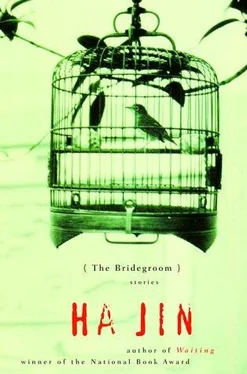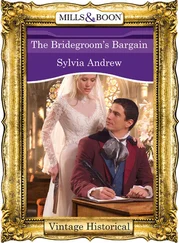“Happy marriage!” the mayor said loudly to Shan.
Shan’s hand trembled and she spilled her apple brandy. The wine stained the cuff of the mayor’s trouser leg and the head of his leather boot.
Guhan stepped forward and grasped her arm, saying with a smile, “Excuse us, Comrade Mayor. She has drunk too much.”
“I understand,” the leader replied unemotionally.
Hurriedly Guhan pulled his bride away. Among all the grooms he seemed the happiest. Some people shot sidelong glances at him.
Within just one hour, more than half of the couples had left. The band was packing up. An old man at the tea stand mumbled, “This is shorter than a breakfast. My seat isn’t warm yet.”
When Guhan and Shan returned to their shack, Mo had fallen asleep in Guhan’s arms. They took off the boy’s khaki jacket and pants and put him into the brick bed, which had been heated by an old woman from the Street Committee of the neighborhood.
Guhan sat down on their only chair and looked at Shan, who was washing her face over a yellow basin in a corner. Steam issued from her head, and her chest bulged a little in a red woolen sweater. Quietly he got up and went over. His palm touched the small of her back, caressing her while his stomach tightened.
She knocked off his hand with the wet towel and turned around, her eyes dim and a few tears on her cheeks. “Don’t touch me!” she cried.
“What happened?” he asked in surprise.
“I can’t do it tonight.”
“Do what?”
“You know.”
“Why?”
“I can’t.”
“Come on, I’ve been waiting for such a long time.” He grinned suggestively.
“I can’t do it.”
He kicked away the brand-new enamel chamber pot, which was a present from the Street Committee, and added, “Then why did you agree to get married?”
She turned to look at the sleeping boy, who didn’t stir. Lowering her head, she burst out sobbing. That frightened Guhan. He embraced her shoulders with one arm and asked rather gently, “What’s wrong, Shan? If you don’t want to, I can wait. Don’t be scared. I’m not a cruel man.” He kissed her cheek and noticed she had long eyelashes, which cast frail shadows on her lower lids.
“I’m not scared,” she moaned with her eyes shut. “I feel so sad, can’t shut my family out of my mind. I see him on your face. Even your voice reminds me of his. Oh, how I miss them! I don’t even have a photo of them.”
Guhan felt bad, but said, “There, now, don’t cry so hard. I’ll help you get over it.”
But her sobbing became unstoppable. She lay down on her stomach beside the boy and buried her face in a pillow. He wanted to console her some, but didn’t know what to say. Having sat in silence for a few minutes, he took off his clothes, climbed into his camp bed, and covered himself with a quilt.
She wept into the small hours.
Before the wedding, Shan had asked Guhan several questions, none of which he could answer. He couldn’t even tell her his exact age, just saying, “I’m around fifty,” or describe what his former family was like. “Probably he goes by an alias,” suggested Aunt Tian, who lived next door. Never had he shown any trace of grief over the loss of his family, whose other members, according to his words, had all vanished in the earthquake. More unusual, he always slept soundly, unlike other newlyweds who would weep or wail for hours during the first few nights. Maybe he hadn’t lost anything or anybody and was actually a gainer.
From the first day, Mo regarded Guhan as his uncle, but he called Shan mother. At night, he’d sleep with her, with his only toy, a MIG-15 jet fighter, placed beside his pillow. He had dark skin, his fat cheeks chapped. His hands and toes and heels were swollen with chilblains. Every night, Shan would wash and rub his hands and feet in warm chili water. The boy would whine with pain, but he allowed her to work on them. Soon scabs formed over Mo’s sores, and Shan kept telling him not to pick them so that they could heal quickly. By the official record, Mo’s father had been a truck driver and his mother a spinner; both had worked in a textile mill.
At a good meal, the boy could eat almost as much as Guhan could. Naturally their grain rations were not enough, and they had to buy some corn flour, rice, and sorghum at tripled prices on the open market. Yet Shan always let Mo eat as much as he wanted. She was a good cook and could make four dishes with half a pound of pork; she was also skillful with needles, her hands often busy knitting something — a sock or a hat or a glove. As Guhan had expected, she turned out to be a dutiful wife and never complained about housework. He felt lucky to have married her, though he was unsure whether he loved her; sometimes he preferred to stay a little longer at the waterworks at the end of the day. Unlike other couples, who would quarrel and fight during their adapting period, Shan and Guhan were very compatible and had none of those problems that many of the newlyweds accused their spouses of having, such as shrieking and kicking in their dreams, abusing children or parents, grinding their teeth at night, sleepwalking, having a bloody nose, or a gluttonous appetite, or bad breath, or underarm odor. Guhan smoked and liked to drink a mug of wine or beer at dinner, but that was normal, as other men did the same.
As it got colder, the three of them would crowd into the brick bed, which they didn’t have enough coal to heat. Every night they’d shiver together for an hour or two before falling asleep. Their only hot-water bottle was tucked under Mo’s feet.
Guhan liked the boy a lot, but he soon thought of having his own baby. This was a once-in-a-lifetime opportunity: every new couple were allowed to have one child of their own. Evidently there would be a baby boom in the city the next summer, since so many women were already pregnant. To Guhan’s dismay, Shan refused to go to the hospital and have the contraceptive ring taken out of her womb. She had just begun to feel comfortable in lovemaking, but she insisted she wasn’t ready for a baby yet. “Be patient, sweetheart,” she said to him one evening. “I’m still very weak. Next year we’ll try.”
“Next year I’ll be an octogenarian,” he replied peevishly.
“Come on, Apple, I still can’t stop thinking of my kids.” Her eyes turned red.
“All right, all right, don’t think of them anymore. We have this baby with us, don’t we?” He grabbed Mo and set him on his lap. The boy seemed to understand what they were talking about; he embraced Guhan’s neck tightly. Outside, an icicle fell to the ground, and the wind was screaming.
Though Guhan didn’t know his age exactly, he felt old, eager to prove he was still fertile. After a few fruitless attempts to persuade Shan to have the ring removed, he gave up, only hoping the policy on new babies wouldn’t change soon. This frustration made him treat Mo more like a son. He would buy him spiced beans, hawthorn flakes, baked sweet potatoes, ice cream bricks, and walnuts. The boy enjoyed riding on his neck to stores and open-air theaters; at dinner the two often shared a mug of wine. At long last, in mid-December, when Guhan bought Mo a wind-up torpedo boat, the boy began to call him dad. Guhan was so happy that he promised to buy Mo a pile of firecrackers at the Spring Festival.
On the whole, they led a peaceful life. The temporary Street Committee voted them a model family in January.
A week before the Spring Festival, the city was decorated with colorful lanterns, scrolls, bunting, and red flags, though a lot of rubble remained uncleared. These days, train after train of relief goods poured into Taifu; as a result, the citizens were allocated more meat, fish, fruit, eggs, and branded cigarettes for the festival than in other years. There were even some fresh vegetables on the market, like cabbages, turnips, spinach, bamboo shoots, cucumbers, garlic stems. Every family was given a coupon for one bottle of wheat liquor, but there was no limit on draft beer and wine. The supply of hard candies and pastry was abundant, too.
Читать дальше












